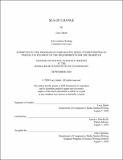Sea of change
Author(s)
Jakub, Lucy(Lucy Marita)
Download1241253952-MIT.pdf (217.1Kb)
Other Contributors
Massachusetts Institute of Technology. Department of Humanities.
Advisor
Apoorva Mandavilli.
Terms of use
Metadata
Show full item recordAbstract
The Gulf of Maine is warming at a faster rate than 99.9 percent of the world ocean, a trend with uncertain implications for the last great maritime fishery: American lobster. Every year, fishermen, scientists, and managers wait to see if the fishery reverses its fantastic growth, which has been a salutary effect of climate change over the past three decades. The gulf has as many horizons as it has islands, and nobody knows the whole thing. Like the story of the blind men and the elephant, every person you ask, even the most expert, will describe a different gulf to you, and a different crisis. What's clear is that the ecosystems of the region have been shaped by many different pressures: domesticated by management, depleted by overfishing, shuffled by natural climatic cycles. The future of the gulf will depend not just on the trajectory of ocean warming, but on whether people can rethink the way we use the environment, and adapt to a changing world.
Description
Thesis: S.M., Massachusetts Institute of Technology, Department of Humanities, September, September, 2020 Cataloged from student-submitted PDF version of thesis. Includes bibliographical references (pages 13-16).
Date issued
2020Department
Massachusetts Institute of Technology. Department of HumanitiesPublisher
Massachusetts Institute of Technology
Keywords
Humanities.